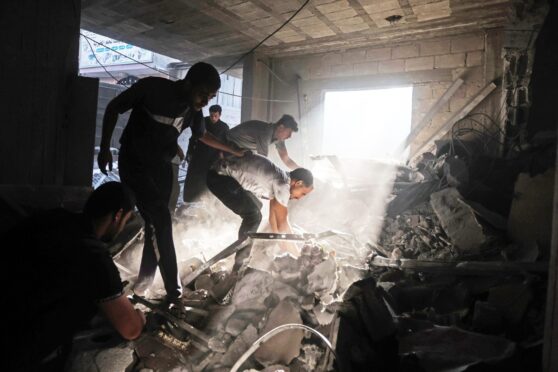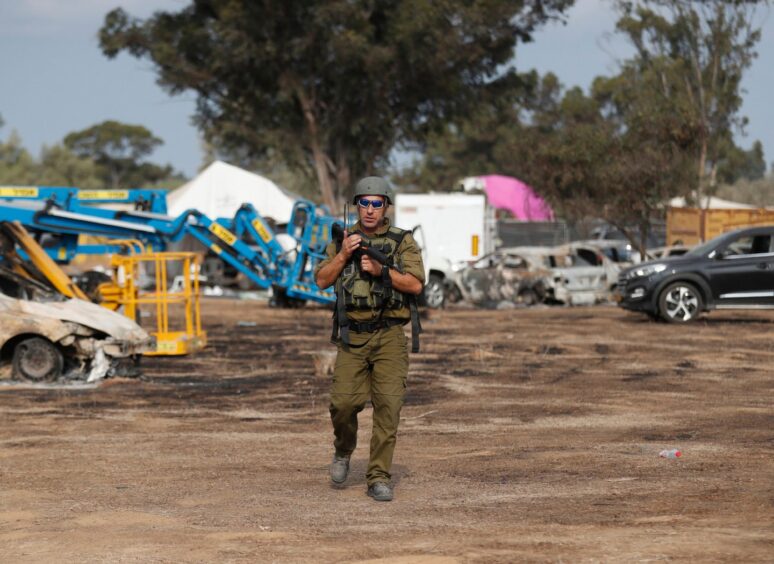
As basic necessities including food, fuel and medical supplies run low, and wounded men, women and children pack into hospitals on the brink of collapse, Palestinians speak of facing an impossible choice – join the crowds fleeing Gaza through rubble and blockades or stay and face air strikes and an impending ground invasion that could claim countless more lives.
While hundreds of thousands have already left their homes in the north of the Gaza Strip – travelling in packed minibuses and cars and even walking through destroyed neighbourhoods – many believe that leaving their homes could be just as dangerous as evacuating, a sentiment echoed by UN officials.
Thousands flee ahead of Gaza invasion after Israel warns ‘get out now’
“We lived a night of horror,” a father of three told Reuters by telephone from Quds hospital in Gaza City yesterday. “Israel punished us for not wanting to leave our home. Is there brutality worse than this?
“I was never going to leave, I prefer to die and not leave, but I can’t see my wife, children die before my eyes. We are helpless.”
“It is inconceivable that more than half of Gaza’s population could traverse an active war zone without devastating humanitarian consequences, particularly while deprived of essential supplies and basic services,” said UN expert Paula Gaviria Betancur as Israeli Defence Forces (IDF) gave millions of residents a 24-hour deadline to evacuate on Friday.
“The humanitarian system in Gaza is already at breaking point. Gaza’s infrastructure has been devastated by indiscriminate bombardments from air, land and sea, and those displaced have nowhere to go. Tripling the displaced population overnight will decimate and permanently alter the civilian population.”
“We will not leave, we will stay together,” said Om Saher, who lives in Beit Lahia in the north with four of her married children and their families.
“Either we live together, or we die together. We will not be displaced again.”
Before last week’s Israeli air strikes, which destroyed 1,000 homes and made hundreds more uninhabitable, just over 75% of Gaza’s population, some 1.7 million people, were registered refugees, according to the UN, with more than 500,000 living in eight crowded camps located across the Strip.
Mosques, hospitals and schools have been targeted by air strikes, according to local reports, while the Gazan health ministry says whole families have been killed in their homes.
In a video interview, Palestinian journalist Plestia Alaqad told ITV News: “We literally live in a ghost town, I can’t recognise the streets, I can’t even recognise my neighbourhood. Massacre, massacre, it’s a complete genocide what’s happening. Every minute that passes, the situation just gets worse and worse. There are no words to describe what’s happening.”
Ahmed, a young man in the north of Gaza, who spoke with a newspaper and asked for his full name and exact location not to be released for his safety, said families had only one option – flee south.
“People are panicked moving from one area to another,” he said yesterday. “They don’t know where to go. I can see them holding their belongings and fleeing since last night. I asked them where they are going; they told me, ‘We don’t know – to UN schools [where people have been sheltering], relatives’ homes, anywhere in the south.’”
Medical services such as cancer care stop in Gaza as surgeons turn to treating bombing casualties
Nevine Ahmed, a mother of six, said she was travelling to Khan Younis in southern Gaza, but it has also been under bombardment.
“I fear Israel may be pushing us to the south,” she claimed. “Then they would bomb us to force us to storm the border into Egypt.”
The World Health Organization (WHO) said there have been 34 documented attacks on healthcare services since last Saturday, with 11 WHO health workers killed by Thursday.
For those that do remain, there are warnings that hospitals could become nothing more than defacto morgues.

Enjoy the convenience of having The Sunday Post delivered as a digital ePaper straight to your smartphone, tablet or computer.
Subscribe for only £5.49 a month and enjoy all the benefits of the printed paper as a digital replica.
Subscribe © ATEF SAFADI/EPA-EFE/Shutterstock
© ATEF SAFADI/EPA-EFE/Shutterstock